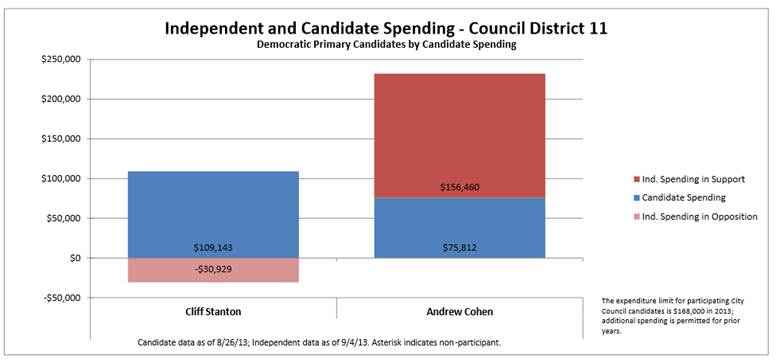Three Charts That Show How Outside Spending Is Dominating NYC Council Races
Here’s another example of how money corrupts the electoral system: a pro-business special interest group has spent almost $7 million on New York City Council races. Jobs for New York is organized by the Real Estate Board of New York, backed by real estate developers, property owners, and other pro-business, pro-developer interests, and has spent an average of $275,000 per race, in some cases spending more on a candidate than the candidate herself.
The dominating nature of this money can be seen in three charts.
- The chart below shows the impact of outside spending in just one of the council races. Of the $210,974 in outside spending, nearly $200,000 of it came from Jobs for New York. Independent spending in this race is greater than the candidate’s own spending.

- In contrast, the council race below does not have a candidate backed by Jobs for New York. In this race, candidate spending dwarfs the amount of outside spending:

- The chart below shows how much money Jobs for New York is spending in opposition ads, in addition to support for its candidate. All of the negative spending and over $146,000 of the outside spending in support of Cohen comes from Jobs for New York.

These charts show how prevalent and corrosive outside money can be. In Districts 7 and 11, the money spent on the candidate by Jobs for New York is greater than the candidate’s own spending. In District 11, Jobs for New York spent more than double what the candidate spent, not to mention a significant amount on negative ads against the opponent.
Apart from an exercise in how elections are funded, why should we care that one group is spending so much money?
Candidates backed by Jobs for New York become dependent on its money to win, which means that Jobs for New York can set the policy priorities for its candidates. The threat of withdrawing financial support is used to push through a pro-business, pro-development agenda, leaving behind the vast majority of New Yorkers. We’ve just lived through 12 years of these priorities and the result is massive income inequality and rising poverty levels.
Until we get rid of the corrosive influence of money in our electoral system, affluent and corporate interests will continue to dominate policy priorities—a reality we cannot afford.

